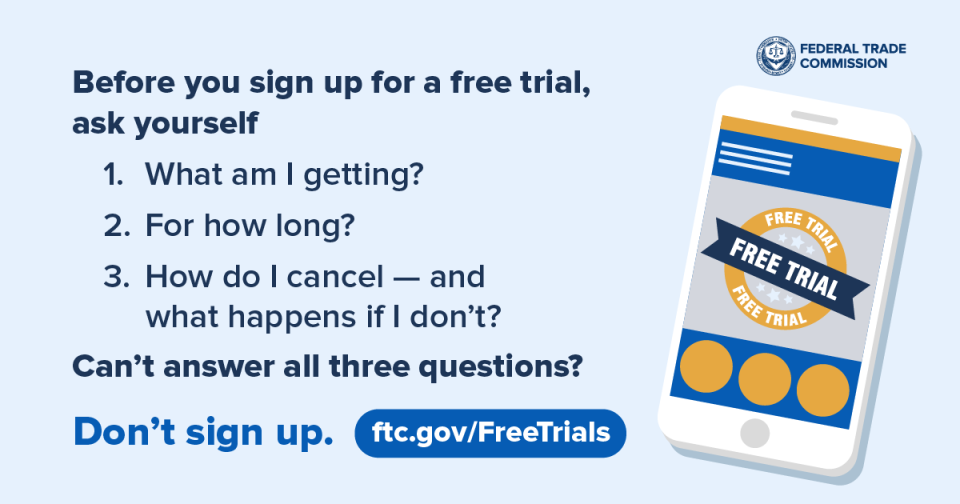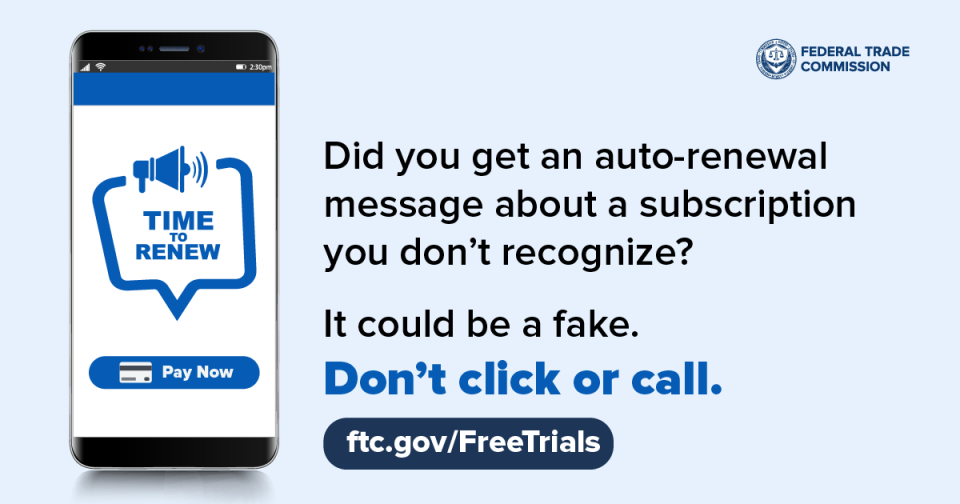You’ve probably seen ads online, on TV, or on social media for subscription offers. They could be for anything from beauty creams and dietary supplements to snacks and magazines. Some say you can try the subscription for free — but it might not be true. Some will auto-renew if you don’t cancel first, which might come as a surprise. Sometimes you’re signed up for a subscription without even knowing it. Learn about subscriptions to save yourself money, time, and aggravation.
Free Trial Offers Can Cost You
Many subscription offers are tempting, especially if they offer a free trial before you commit. But free trial offers often have a catch.
Before you sign up, know these three things about free trial offers:
1. If you don’t cancel on time, you’ll probably be charged. Usually, you have to give your credit card number for a “free trial.” That way, the company can charge you if you don’t cancel before the trial ends. Dishonest businesses make it tough to cancel and will keep charging you — even if you don’t want the product or subscription anymore.
Advice: Make sure you know the terms of the trial. If you sign up, make a note on your calendar to remind you to cancel before the trial ends. If you can’t cancel, call your credit card company, and ask them to stop the payments.
2. If you have to pay for shipping or fees to get your “free” trial, it’s not really free. The offer might say you can try a product for free — but you have to pay a small fee for shipping or something else. You might think those few dollars are no big deal, but after the trial ends, you might see higher charges than expected on your credit card — or charges for products you didn’t want or order.
Advice: Free means free. If a company offers something free but says you have to pay to get it, at best it’s a dishonest business you might not want to deal with. At worst, it might be a scammer.
3. That online ad you saw might not be from the company selling the product. Companies hire affiliate marketers to promote a product and create many of the ads you see online for free trials. Affiliate marketers get paid every time you click on their ad. Some dishonest affiliate marketers put out ads with exaggerated claims or misleading information to get you to click.
Advice: Remember that some ads might be designed to make you click, not tell you the truth about the offer.
Before you sign up for a free trial offer
- Find the terms and conditions for the offer. They should tell you
- Exactly what you’re agreeing to
- The length of the trial
- How and when to cancel if you don’t want to be charged after the trial
If you can't find this information or don’t understand exactly what you're agreeing to, it might be a sign that the company will make returns and cancellations difficult. Don't sign up. Sometimes, return and cancellation policies on free trials are so strict that it can be almost impossible to cancel.
- Research the company online. See what other people are saying about the company's free trials, but make sure to compare reviews from a wide variety of review and retailer websites, search engines, and other sources. Real user reviews can tell you more about the offer you’re considering. Search for the company’s name with the words “scam” or “complaint.” Complaints from other customers might be a sign that there are "catches" with the trial.
- Look for information on how to cancel future shipments or services. If you don't want the product or service anymore, how do you cancel? Can you skip or change shipments if you don’t want to fully cancel? Do you have a limited time to respond? The company must be clear about these things up front.
- Watch for pre-checked boxes. If you sign up for a free trial, look for boxes that are already checked for you. That checkmark might give the company permission to keep charging you after the free trial, sign you up for more products that you must pay for, or share your information with others. Make sure to uncheck a box if you don’t agree with what it says.
After you sign up for a free trial
- Mark your calendar. Your free trial offer has a time limit. Once the deadline to cancel passes, you might be on the hook for more products or services and more payments.
- Monitor your credit and debit card statements. That way you'll know right away if you're being charged for something you didn't order. See How To Stop a Subscription below for more on how to dispute a charge you didn’t authorize.
Advice on Auto-Renewals
If you’re happy with a subscription and want to keep it, auto-renewals can be convenient.
Keep these three things in mind about auto-renewals:
1. Don’t ignore a renewal notice. A renewal notice is simply a reminder that says when your subscription expires and that you’ll be automatically charged when it does. If you already agreed to auto-renew, this isn’t a bill or an invoice, so it shouldn’t ask for your credit card information.
Advice: If you get a renewal notice online or in the mail that asks for your credit card information, stop. Read the notice carefully. The company might be trying to get you to renew an old subscription you already canceled. Or it could be a scammer lying about the renewal notice to get your credit card information.
2. Check that the cost is what you expected. Sometimes, an automatic renewal might charge more than you paid the last time. This might happen if you initially had a promotional rate. When you get your renewal notice, read it closely to confirm that the rate is what you expected. If it isn’t, or if the notice doesn’t say how much you’ll pay, call the company right away. See if they can lower the rate or cancel your subscription if you don’t want to keep it.
Advice: Sometimes, you can cancel a subscription and resubscribe for a better promotional rate. Be sure you know exactly when that new promotional period ends and mark it on your calendar. Also know when and how much you’ll be charged once the promotion ends.
3. Scammers sometimes send fake renewal notices to get your financial information. If you get a renewal notice online or in the mail for a subscription you don’t have, it’s probably from a scammer or a dishonest company trying to get you to give them your credit card number or other personal information. Don’t call the number on the notice or click on any email or text message link.
Advice: Search online for the company name with the words “scam” or “complaint” to see if other people got the same fake renewal notice. If it’s a company you do business with, contact the company at a number you know is correct to see if the renewal notice is real, not the number from the call or text.
Negative Options Explained
A negative option is when you're automatically billed for something when you didn't specifically say not to bill you. It's a common practice businesses use, often with free trial offers and subscriptions.
For example, you agree to try a box of products free for a month. After that month, you’re charged automatically for monthly shipments until you cancel. Or, you get a magazine subscription that renews automatically when it expires. Those are negative options. The business takes your silence as permission to charge you.
Problems with negative options happen when the business doesn’t clearly explain that it will keep billing you unless you do something — or if the business makes it difficult or impossible for you to cancel.
Before you give your credit card for a free trial or subscription
- Read all the details. See if the business will keep charging you unless you tell them to stop. If that’s not clear to you, assume it will, since the business wants your credit card information.
- Look for pre-checked boxes. Some businesses use these hoping you won’t notice that you’re agreeing to be billed later. Uncheck the box if you don’t agree with what it says.
- Make sure you know how to cancel. When signing up, look for an explanation of how to cancel. Before businesses get your credit card information, they have to tell you how to cancel. Businesses must make canceling simple for you. It’s the law. If it’s not clear to you how to cancel, walk away.
If you’re charged without your consent, and the company won’t refund your money, dispute the charge (also called a “chargeback”) with your credit or debit card company right away.
How To Stop a Subscription
If you want to stop a subscription:
- First, look up the company that runs the subscription you want to cancel. If the company has instructions on how to cancel, follow those. Keep a copy of your cancellation request, along with notes about any conversations you had about canceling.
- Watch your bank or credit card statements. Check for charges on your debit or credit card after you canceled the subscription. If a company charged you extra or won’t stop charging your account after you told them to cancel your subscription, file a dispute for chargeback with your credit or debit card.
- Online: Log onto your credit or debit card online account and go through the dispute process. If you haven’t set up an account with your credit or debit card company, check out the company’s website to find out how to file a dispute.
- By phone: Call the phone number on the back of your card and tell the company why you’re filing a dispute.
- Follow up with a letter to your credit or debit card company. To protect any rights you might have, follow up in writing by sending a letter to the address listed for billing disputes or errors. Use this sample letter. It’s a good idea to send your letter by certified mail and ask for a return receipt so you have proof of what the creditor got.
- Save your records. Keep any letters, notes, or emails related to what happened— they could help prove you’re entitled to a refund if the credit or debit card company has any questions.
Report Problems
If you have problems canceling a subscription, or you’ve been charged for a subscription you didn’t agree to, report it to
- the FTC at ReportFraud.ftc.gov
- your state attorney general


